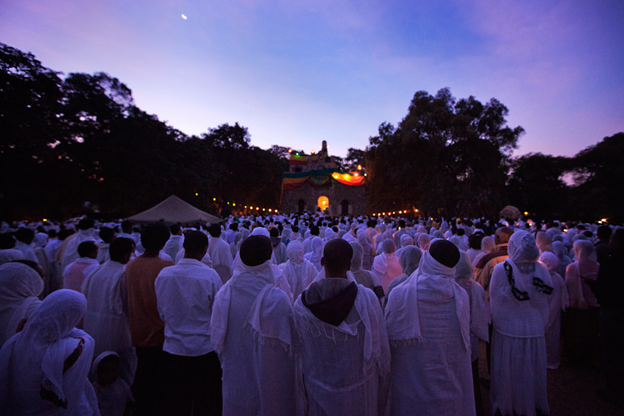Special to Ethiopia, this colorful three-day annual carnival, Timket is celebrated on the 21st of January to commemorate Christ’s baptism. The celebration dates back to the 16th century and involves laying long red carpet on streets, worshiping, feasting and procession. During this religious festival, the streets are filled with pilgrims who come to re-enact the baptism of Jesus in the Jordan River and take a dip in the holy waters. The celebration is also a time when people meet their future significant other. Jovago, Africa’s leading online hotel booking company brings you to this not-to-be-missed spectacular festival.
Celebration begins on the 19th of January which is known as Ketera meaning eve of Timket. On this day the Tabots, a model of the Ark of the Covenant, is carried by a chosen priests in a procession to the blessed water. The Tabots is wrapped in silk clothing placed on the heads of priests, who parade the streets. The priests, clad in ceremonial clothing are escorted by the jubilating crowd as they make their way to the baptism location.
Dressed in the dazzling sparkling white (habesha libise) traditional clothing, people march several streets following the models of the Ark of Covenant to pay their respect. Priests sprinkle the holy water on the large crowed in commemoration of Christ’s baptism while others are dipped into the pool while fully dressed to get baptized.
On the celebration day, numerous people gather at Jal meda in Addis Ababa to watch the ceremonial baptism and worship. Ethiopians from across the country and visitors from around the world gather in celebration centres to enjoy the stunning festivity. A special tent is setup where each Tabot rests as members of the church and the public loudly sings and worships with the accompaniment of traditional music instruments. This breathtaking festival is celebrated in the famous Gonder, Lalibela and in the capital city Addis Ababa.
As one part of the unique feature of the celebration, people attend the carnival looking their best to meet future possible spouses. In ancient times, the day used to represent an important day for a man to identify the women he will marry from the large crowd. The tradition is kept to this day allowing men and women to identify a person whom they find attractive. The festival culminates in the priests delivering the final service taking the Tabots back inside the church.
After the carnival, the celebration continues with a large feast with traditional special dishes of food and drink including distinctive dishes like doro stew with boiled eggs, chopped collard greens, kitfo (minced raw beef), tibs (traditionally seasoned and fried meat) and gord gored (cubed raw meat) is often served with spice and ayibe (crumble cheese) as a side dish to ease the spicy food.
By Eden Sahle


